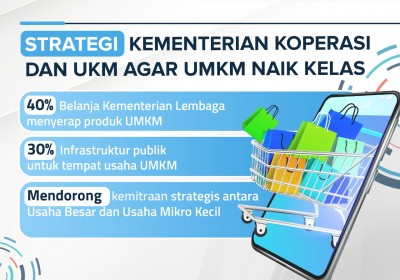Indonesia’s UMKM Products Slowly Becoming Major Contributor to Global Halal Supply Chain
May 07, 2021
JAKARTA – According to the Salaam Gateway’s 2020/2021 State of The Global Islamic Economy Report, Indonesia is ranked 4th on the Global Islamic Economy Indicator, indicating the strength of Indonesia’s Syariah economy.
Indonesia has also placed in the top 10 of the halal foods, Syariah finance, halal tourism, Muslim fashion, halal medicines and cosmetics and halal media categories as well.
For Indonesia’s Small-to-Medium-Scale (UKM) and Cooperatives Minister (MenkopUKM) Teten Masduki, these achievements show that Indonesia has the potential to become the world’s largest Syariah economy in the future.
Several strategic programs in order to fulfill that goal have been initiated by the KemenkopUKM. Among them include the mandatory rule that all government institutions must procure at least 40% of their supplies from local micro-to-small-to-medium scale businesses (UMKM), ensuring that 30% of the public infrastructure accommodates UMKMs and the promotion of strategic partnership between large-scale businesses and UMKMs.
“Recently, the president has just instructed us to increase the bank credit ratio for UMKMs from 20% to more than 30% by 2024,” Minister Teten said through a written statement on Friday (9/4).
The previous maximum credit platform of Rp 500 million has risen to Rp 20 billion and micro credit loan (KUR) ratio rose from Rp 50 million to Rp 100 million without collateral. Minister Teten said that these increases must be utilized by the government to help UMKMs “graduate” into larger scale businesses.
“I hope that this multi-partner collaboration can be sustainable and be carried out without much problems so that we, the government, are able to provide a positive impact to the public, especially to UMKMs. Always remember to always purchase, use and be proud of our UMKMs’ products!” the Minister said.
Additionally, Minister Teten revealed that the largest challenge for UMKMs to obtain halal certification is primarily the high fees which tend to put off UMKMs from obtaining them, making access difficult. As a result, only medium-scale to large-scale businesses are typically able to obtain halal certificates for their businesses.
The recently passed Omnibus Job Creation Law states that UMKMs are able to obtain halal certificates free of charge. This is bolstered further in Presidential Decree no.7/2021 on easing business processes for the empowerment of local UMKMs, through a one-stop system which helps small businesses obtain licenses, standardization certificates and halal certificates more easily.
Another program, the UMKM Integrated Management system, adds the minister, is also designed to include and promote establishment/legalization efforts, financing, raw material supply, production processes, product curation and digital marketing measures.
“These two programs must be implemented collaboratively by the central government, regional governments and all other relevant stakeholders,” he said.
Indonesia’s Research Institutions Supporting the Development of the Electric Vehicle Industry
Indonesian Muslim Fashion and Cosmetics IKMs Shine at Dubai World Expo 2020
Govt Steps Up UMKM Transformation Efforts in the Midst of Pandemic Slowdown
Govt Encourages Promotion of IKM Products in Digital Era
Government Begins Developing Maritime Training Center in Makassar
Tweets by IDDevForum
